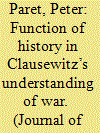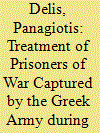|
|
|
Sort Order |
|
|
|
Items / Page
|
|
|
|
|
|
|
| Srl | Item |
| 1 |
ID:
162838


|
|
|
|
|
| Summary/Abstract |
Between 1939 and 1944, the Canadian Army underwent significant reforms to redress prewar deficiencies in the training of its infantry junior noncommissioned officers. The startling German successes of 1940 would eventually challenge the Canadian traditional tactical culture. As a result, the Canadian Army would expand its training organization as well as revising and updating its tactical doctrine and training. However, owing to a narrow-minded military culture, the new ideas came across some resistance. This article examines this process at work and thereby disputes the concept of a straight Canadian ascending learning curve during the Second World War.
|
|
|
|
|
|
|
|
|
|
|
|
|
|
|
|
| 2 |
ID:
162833


|
|
|
|
|
| Summary/Abstract |
Drawing on statements by Clausewitz long known but ignored, the article traces his early and soon dominant interest in the past as it develops out of his experiences as a child and young man to become a major element in his thinking about the present. The article points to his easy shifting back and forth between an exclusively military approach to the history of war and a more encompassing political, social, and cultural interpretation that emphasizes the psychological forces of leaders and followers, and comments as well on the relationship between his historical and his theoretical work. In noting some general issues that turn people into historians, while following the unique conditions that led to Clausewitz’s massive historical writings, the article opens new perspectives on his thought and his times that may be worth pursuing further.
|
|
|
|
|
|
|
|
|
|
|
|
|
|
|
|
| 3 |
ID:
162837


|
|
|
|
|
| Summary/Abstract |
In the wake of the battle of La Lys (9 April 1918), the British High Command on the Western Front fought a sustained campaign to keep the remnants of the Portuguese Expeditionary Corps (CEP) from returning to the front lines. This article examines this campaign, which rested on the British view that the CEP had been largely responsible for its own destruction and for placing the Allied position in Flanders at risk. Portuguese officers were especially singled out as incompetent and too proud to adapt to the new realities of the battlefield. The question was made complicated by the sometimes ambivalent attitude to the conflict of Portuguese President Sidónio Pais, who had staged a coup against the country’s interventionist government in December 1917. Pais, more concerned with establishing what he called a “New Republic” than the war, did not view the CEP as his deposed predecessors had done—as the key to a glorious future for Portugal. Still, in the wake of La Lys, he maintained that the CEP should be reorganized, reinforced and returned to the front lines. Caught in the crossfire between the Portuguese government and the British High Command, the CEP’s officers and soldiers, employed in secondary duties many saw as humiliating, waited for a final decision regarding their future. In the very last days of the war some units did return to the front, but only after a number of mutinies were repressed.
|
|
|
|
|
|
|
|
|
|
|
|
|
|
|
|
| 4 |
ID:
162834


|
|
|
|
|
| Summary/Abstract |
During the first six months of the War of 1812, American frigates defeated three British frigates. These losses did little to affect Britain’s actual naval dominance, but the moral impact proved a bitter shock for the world’s pre-eminent naval power. Negative reactions rippled through the print media, the political public, and the naval officer corps, leading to questions about the very nature of British naval superiority. In response, British naval leaders made difficult choices about procurement and rules of engagement, minimizing the risks faced by British warships and protracting the naval conflict long enough to take advantage of American missteps.
|
|
|
|
|
|
|
|
|
|
|
|
|
|
|
|
| 5 |
ID:
162839


|
|
|
|
|
| Summary/Abstract |
Much recent writing on the post–World War II Occupation of Japan (1945–1952) has challenged the traditional picture of a well-disciplined American army laying the groundwork for Japan’s transition to democracy by the example of its behavior. Instead it depicts the Occupation, especially its opening phase, as marred by the widespread rape of Japanese women by American servicemen. Copious documentation of American behavior from both Japanese and American sources does not support such claims. Rather, it makes very clear that though there was some sexual violence perpetrated by American and other Allied servicemen, stories of mass rape during the Occupation are simply not credible.
|
|
|
|
|
|
|
|
|
|
|
|
|
|
|
|
| 6 |
ID:
162840


|
|
|
|
|
| Summary/Abstract |
This article examines an attempt by the historian Theodore Ropp (1911–2000) to remake Edward Mead Earle’s Makers of Modern Strategy (1943). It considers Ropp’s motivation for embarking on this project against the backdrop of his career and the development of academic military history in the United States. It then focuses on the Makers project, examining the scope and parameters within which Ropp conceived of his future volume and the ways in which he attempted to realize it. Although Ropp’s project ultimately failed, his Makers underlines some of the ways in which military history developed since the Second World War.
|
|
|
|
|
|
|
|
|
|
|
|
|
|
|
|
| 7 |
ID:
162836


|
|
|
|
|
| Summary/Abstract |
In 1899 and 1907, international conventions providing for more humane treatment of prisoners of war (POWs) were signed at The Hague. But these new international norms seem to have done little to alleviate the mistreatment of POWs in the Balkan Wars in southeastern Europe in 1912–13. This article seeks to explain why this occurred by using the treatment of Ottoman and Bulgarian POWs held by the Greeks in the 1912–13 wars as a test case. Two intermingled factors seem to have led to the violation of the Hague Conventions: the inability of economically strapped Greece to cope successfully with such an urgent humanitarian situation and the negative stereotypes of the enemy, which were enhanced by combat brutalization. The participants in the two Balkan wars appropriated long extant European stereotypes of Balkan peoples as backward and uncivilized and applied them to their opponents.
|
|
|
|
|
|
|
|
|
|
|
|
|
|
|
|
| 8 |
ID:
162835


|
|
|
|
|
| Summary/Abstract |
Historians have generally recognized The War of the Pacific (1879-1884) as a significant event in the political, military, and economic history of South America. Applying an international lens to the conflict reveals its influence on extra-regional states and actors. Violence along the Pacific Slope in the 1860s stimulated demand for surplus (especially U.S. Civil War-era) and experimental weapons, while also offering an operational laboratory for their evaluation. During the war, additional and decidedly “modern” technologies were produced by foreign firms and local actors alike. Information about the efficacy of these systems was carefully documented by international observers as far away as the United States and China. Beginning in the 1880s, Chilean naval preponderance in the American Pacific—a key military result of the war—threatened both U.S. expansion in the region and the ideology of racial superiority which underwrote it. That challenge, in turn, stimulated and for many justified the emergence of the U.S. “New Navy” in the 1890s. An international perspective, as such, suggests the profound and unpredictable ways in which regional or peripheral violence articulated with Great Power politics and navalism in the late nineteenth century.
|
|
|
|
|
|
|
|
|
|
|
|
|
|
|
|
|
|
|
|
|